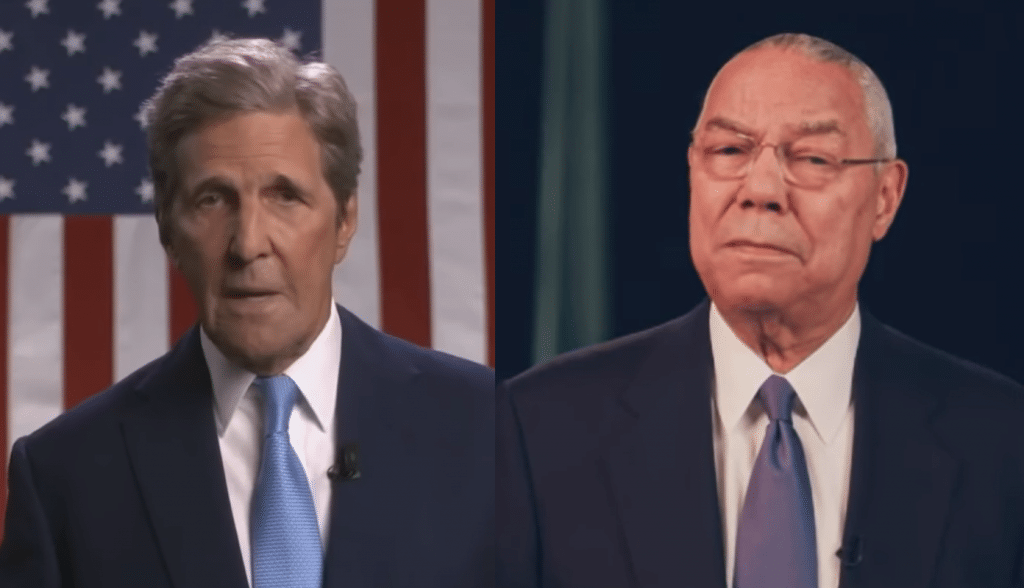Convention takeaway: Democrats (and some Republicans) call for a return to multilateralism
By Halley Posner | August 28, 2020
 Former secretaries of state John Kerry and Colin Powell both spoke at the 2020 Democratic National Convention and emphasized the need to work with other countries to solve global problems.
Former secretaries of state John Kerry and Colin Powell both spoke at the 2020 Democratic National Convention and emphasized the need to work with other countries to solve global problems.
Words have the power to cripple countries or end wars, take down economies or start revolutions. Over the past three and a half years, the rhetoric coming from the United States’ highest office, the presidency, has been terse, belligerent, and inconsistent. With little more than a few tweets, President Trump has withdrawn the United States from multiple arms control agreements, the Paris climate change accord, and even the World Health Organization—in the middle of a pandemic, no less.
But four nights of speeches at the Democratic National Convention offered a hint of the change that could ripple through the world if Democrats win the White House in November. The convention included an ideologically diverse set of speakers who highlighted the need for multilateralism—the need for the United States to work with other countries to keep Americans, and the world, safe. They reasoned that the major threats facing Americans cannot be solved unilaterally. Countries must band together to solve the world’s most hazardous risks, including nuclear proliferation, climate change, and pandemics. A return to multilateralism could usher in a new era of treaties, alliances, and cohesion for the global order, making the world a safer place.
Remarkably, both John Kerry, the secretary of state under President Obama, and Colin Powell, secretary of state under President George W. Bush, stressed the driving need to work with allies to get back into treaties and agreements that help manage global problems. Kerry emphasized that “none of the issues of this world, not nuclear weapons, not the challenge of building back better after COVID, not terrorism, and certainly not the climate crisis…can be resolved without bringing nations together with strength, and humility.…This moment is a fight for the security of America, and the world.” Powell, similarly, said that Biden would “restore America’s leadership in the world, and restore the alliances we need to address the dangers that threaten our nation, from climate change to nuclear proliferation.”
Michelle Obama echoed those sentiments. She minced no words, saying, “Internationally, we’ve turned our back, not just on agreements forged by my husband, but on alliances championed by presidents like Reagan and Eisenhower.”
This is not empty talk. Under President Trump, the United States has left the Intermediate Range Nuclear Forces Treaty negotiated by President Reagan, the Open Skies Treaty signed by George H. W. Bush, and Obama’s nuclear deal with Iran. Not to mention, the United States is poised to let the last bulwark of arms control, New START, die an unnecessary death by taking no action to renew it before it expires in February 2021. New START is the only remaining legally binding constraint on the world’s two largest nuclear arsenals. Often, the termination of these agreements came not in the form of carefully crafted messages written by top tier governmental officials trained in diplomacy, but rather via the president’s Twitter account, in just 280 characters.
Nuclear agreements are not the only ones from which the United States is withdrawing. In November 2019, the Trump administration sent formal notice that it will pull out of the Paris Agreement, the landmark multilateral collaboration meant to bring the countries of the world together in the shared goal of cutting back greenhouse gas emissions. The United States is the only country left on the planet that rejects the global accord; the last holdouts, Syria and Nicaragua, signed on in late 2017. The fact that the world’s second largest producer of greenhouse gasses refuses to do its part to curb its climate impact means that the treaty will only cover 80 percent of the worldwide emissions, rather than 97 percent. Climate change is not an issue that stops at border checkpoints; it requires all countries to engage in a unified effort to try and staunch the effects.
Another issue that does not recognize borders is the pandemic. On July 7, 2020, by which point well over 100,000 Americans had died from COVID-19, the Trump administration formally notified the United Nations that it was terminating its relationship with the World Health Organization (WHO). The WHO is a multilateral organization at its core, comprised of 194 member countries all seeking to keep the world healthy. In WHO’s last funding cycle, the United States contributed $893 million, or about 15 percent of the total budget, which, at $5.6 billion for two years, is about the operating budget of a single large hospital in the United States. For what the United States government contributes, its interests are greatly served by WHO, illustrated by the organization’s disease control objectives, areas of strategic interest, and collaboration with US scientists, especially at the Centers for Disease Control and Prevention. Leaving the WHO will have detrimental effects on combatting the current pandemic and preparing for future ones.
The effects of a nuclear exchange will radiate past its intended targets, germs can travel anywhere, and global warming will reshape ecosystems on every continent. As the Democratic National Convention illuminated, American politicians of many stripes know the detrimental effects of refusing to work with other countries. There is still time to rectify some of the mistakes from the past three and a half years. But the next president must quickly take action to revive the agreements that are still salvageable, such as New START and the Paris Agreement, and to rejoin WHO as a member state. Much damage has already been done, but with the right person at the helm, these mistakes do not have to be irrevocable.
Together, we make the world safer.
The Bulletin elevates expert voices above the noise. But as an independent nonprofit organization, our operations depend on the support of readers like you. Help us continue to deliver quality journalism that holds leaders accountable. Your support of our work at any level is important. In return, we promise our coverage will be understandable, influential, vigilant, solution-oriented, and fair-minded. Together we can make a difference.
Keywords: 2020 presidential election, COVID-19, Iran nuclear deal, JCPOA, Paris Agreement, climate change, nuclear risk reduction
Topics: Opinion, Voices of Tomorrow
















The fact that a milquetoast endeavor like multilateralism is controversial among an entire wing of the body politic shows what’s wrong with our country.